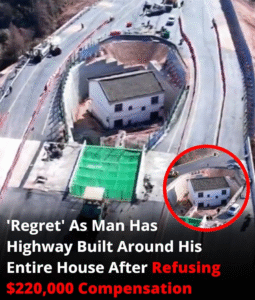
‘Regret’ After Man Refuses $220,000 For Home And Has Highway Built Around It
In a story that has captivated international attention, a Chinese man who once refused a $220,000 offer for his home now finds himself living in the middle of a bustling highway—literally. The small, aging house stands defiant among the roaring traffic, encircled by asphalt and concrete, a solitary symbol of resistance, but one now steeped in regret.
The homeowner, identified only as Mr. Luo, was among the last holdouts in his neighborhood in eastern China, where developers and government officials had long planned to build a major roadway. As compensation offers were made to homeowners in the area, most agreed to sell their properties and relocate. Mr. Luo, however, refused—believing the offer wasn’t enough to cover the cost of a new home in the same area, and determined not to be forced out.
Officials reportedly offered him 1.6 million yuan (around $220,000), a sizable sum, but not enough for Luo, who cited emotional attachment to the home he had lived in for decades and skepticism over property values elsewhere. What followed was a standoff. With construction already underway and deadlines looming, the authorities made a controversial decision: build around the house.
Today, the two-story structure stands in the middle of a divided four-lane highway. Cars speed by on either side, with no buffer zone to protect the home or its lone occupant. It’s a surreal sight—an ordinary home surrounded by chaos. Images of the house, often described as a “nail house” (a term used in China for properties whose owners refuse to sell), have gone viral, sparking debate online about property rights, government pressure, and the true cost of standing one’s ground.
For Mr. Luo, the reality of his decision has set in. While he once hoped to force a better deal or preserve his cherished family space, he now admits he underestimated the consequences. The house constantly shakes from traffic vibrations. Noise pollution is relentless. There is no access to public utilities, and visitors rarely come. He’s effectively isolated—marooned in a sea of moving vehicles.
“It’s not what I imagined,” he said in an interview with a local paper. “I thought I was protecting my rights, but now I just feel forgotten.”
His story serves as a modern parable about the costs of stubbornness versus the need for fairness in compensation. Supporters say Luo deserved a better offer, especially given skyrocketing housing prices. Critics say he miscalculated badly.
Ironically, Luo now says he would accept the original deal if it were still on the table—but it’s not. The road is complete, and no further compensation is likely. The government has declared the project finished.
Now, his home remains—less a residence than a monument to defiance and an unintended cautionary tale about pride, protest, and compromise.
